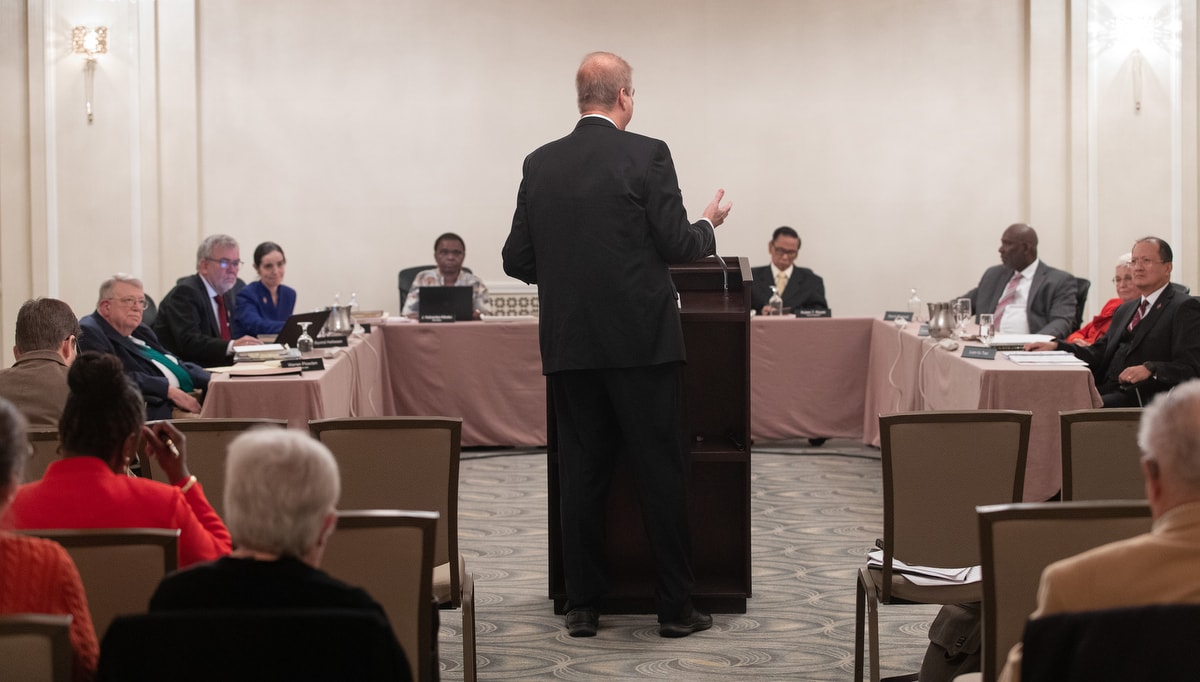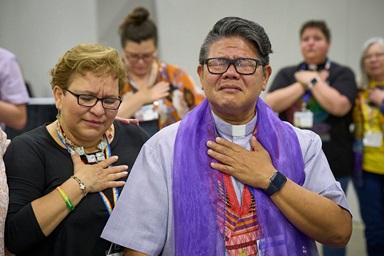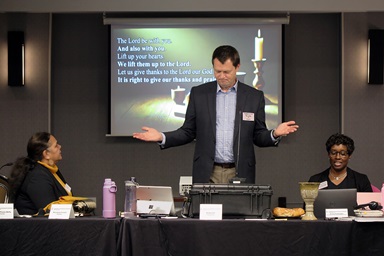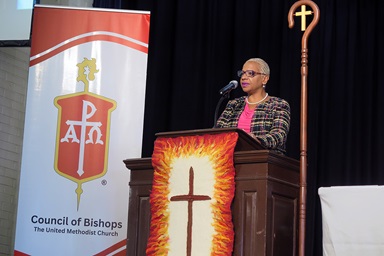La legislación que establece disposiciones especiales para las iglesias metodistas unidas que deciden abandonar la denominación entró en vigencia inmediatamente al finalizar la Conferencia General Especial del pasado mes de febrero, dictaminó el tribunal superior de la iglesia.
Al tomar esa determinación, el Concilio Judicial Metodista Unido desestimó, al menos temporalmente, la solicitud anular el procedimiento de hecha por la Comisión de la Conferencia General, basado en las irregularidades encontradas en el proceso de votación para aprobar el proceso de desafiliación y que sustituía partes de la Petición 90066.
El tribunal decidió suspender la solicitud presentada por el Concilio de Obispos/as sobre las irregularidades en el proceso de votación, hasta su próxima sesión. En la Decisión 1386, el Concilio Judicial señaló que "debido a nuestra imposibilidad para obtener la información solicitada durante el argumento oral será mejor reprogramar el caso”.
Por otra parte, el Concilio Judicial no decidió sobre la “constitucionalidad, significado, aplicación o efecto” de ciertas peticiones del Plan Tradicional, también adoptado en febrero. "Los votos de los miembros del concilio fueron insuficientes para declarar inconstitucional cualquiera de las disposiciones que tuvimos ante nosotros/as", dijo el tribunal en el Memorándum 1390. Al menos seis de los/as nueve miembros del Concilio Judicial deben estar de acuerdo en una votación sobre cuestiones constitucionales.
"Nuestras decisiones sobre la constitucionalidad, el significado, la aplicación o el efecto de las diversas disposiciones, deberán esperar por los hechos específicos que se desprendan de su aplicación, en los casos que se presenten ante el concilio después del 1 de enero de 2020", dijo el tribunal, refiriéndose a la solicitud del Concilio de Obispos/as para aclarar cinco preguntas relacionadas con el Plan Tradicional.
Estas y otras decisiones se publicaron después del cierre de la sesión del tribunal, que se reunió entre el 29 de octubre y el 1 de noviembre, incluidas dos audiencias orales el 30 de octubre. Warren Plowden, laico y primer suplente, participó en la reunión en el lugar de la miembro del Concilio Judicial, Lidia Romao Gulele, quien no pudo asistir.
En la Decisión 1385, el Concilio Judicial determinó que la fecha efectiva propuesta en el proceso de desafiliación, nunca había sido cuestionada, incluso después de que la Petición 90066 original fuera enmendada por el informe minoritario. "El cuerpo entendió claramente que solo esos cambios específicos en el informe de la minoría era los que habían sido establecidos previamente. El texto preliminar permaneció sin cambios antes de la Conferencia General. La fecha de vigencia del Párrafo 2553, es el momento de la clausura de la Conferencia General Especial".
En un caso relacionado sobre desafiliación, el tribunal aplazó hasta su próxima reunión la deliberación de un fallo sobre una cuestión de ley por parte del Obispo de la Conferencia de Nueva Inglaterra, Sudarshana Devadhar, sobre la política de desafiliación y el proceso de discernimiento de esa conferencia.
Otro de los asuntos derivados de la Conferencia General 2019, fueron una serie de artículos sobre decisiones legales de los/as obispos/as sobre varias acciones de las conferencias anuales que se consideraron en esta reunión de octubre.
Entre las decisiones tomadas por el Concilio Judicial están:
- La afirmación de la Decisión 1399, que declara fuera de orden la resolución tomada por la conferencia de Sky Mountain, liderada por la Obispa Karen Oliveto, sobre la negación de cumplir con el Plan Tradicional o con las prohibiciones de la iglesia sobre la homosexualidad.
- La declaración a lugar, en la Decisión 1398, de la resolución tomada por la Conferencia Anual de California-Pacifico e introducida por el Obispo Grant Hagiyaque establece que la prohibición del financiamiento de litigios contra el clero, por ser ilegal y porque "porque viola el principio de legalidad y los derechos del debido proceso de los/as clérigos/as".
- La afirmó de las Decisiónes 1395 y 1396, que declara aspiracionales y no violatorias de la ley de la iglesia, las decisiones del Obispo J. Michael Lowry sobre las resoluciones de la Conferencia del Centro de Texas en torno al futuro de la la conferencia y la transparencia sobre los costos financieros de las denuncias del clero.
- La reafirmación de la en la Decisión 1392, que declara aspiracional la resolución de la Conferencia del Norte de Texas y presentada por el Obispo Michael McKee, que destaca la conveniencia del Plan “Una Sola Iglesia”.
- La declaración a lugar, en la Decisión 1389, una parte de la resolución de la Conferencia Anual de Upper Nueva York, presentada por el Obispo Mark J. Webb, que afirma el valor de las personas de la comunidad LGBTQ+; mientras que declara inconstitucional otra parte de la resolución que prohíbe la financiación de litigios contra los/as clérigos/as por violar el Libro de Disciplina.
- La confirmación de la Decisión 1391, presentada por la Obispa LaTrelle Miller Easterling, que declara adecuado la decisión de la sesión del clero de la Conferencia Anual de Baltimore-Washington de 2019, de aprobar los/as candidatos/as al ministerio en grupo.
Suscríbase a nuestro nuevo boletín electrónico en español y portugués UMCOMtigo
Respondiendo a una pregunta de constitucionalidad presentada por la Conferencia Anual del Oeste de Pensilvania, el Concilio Judicial encontró que varias disposiciones bajo la ley de la iglesia sobre asuntos administrativos de una conferencia anual son "inconstitucionales, nulas y sin efecto".
En la Decisión 1383, el tribunal superior determinó que las disposiciones del Libro de Disciplina "que establecen el proceso administrativo" sobre licencia involuntaria de ausencia, retiro involuntario, ubicación administrativa y suspensión de la membresía provisional violan las garantías de "un proceso justo e imparcial" encontrado en la ley de la iglesia.
La lista completa de las Decisiones 1380 a 1399 de la reunión de octubre se puede encontrar en el sitio web del Concilio Judicial.
* Bloom es el editor asistente de Noticias Metodistas Unidas y tiene su sede en Nueva York. Síguela en https://twitter.com/umcscribe o contáctala al 615-742-5470 o [email protected]. Para leer más de Noticias Metodistas Unidas, suscríbase al resumen quincenal gratuito presionando aquí.
** El Rev. Gustavo Vasquez es el Director de Noticias Metodistas Unidas para la audiencia hispano-latina Comunicaciones Hispano/Latinas de la IMU. Puede contactarle al (615)742-5111 o por el http://[email protected].




